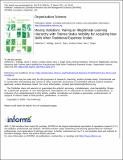| dc.contributor.author | Kellogg, Katherine C | |
| dc.contributor.author | Myers, Jenna E | |
| dc.contributor.author | Gainer, Lindsay | |
| dc.contributor.author | Singer, Sara J | |
| dc.date.accessioned | 2021-10-27T20:04:57Z | |
| dc.date.available | 2021-10-27T20:04:57Z | |
| dc.date.issued | 2021 | |
| dc.identifier.uri | https://hdl.handle.net/1721.1/134427 | |
| dc.description.abstract | © 2020 The Author(s). We explore how members of a community of practice learn new tools and techniques when environmental shifts undermine existing expertise. In our 20-month comparative field study of medical assistants and patient-service representatives learning to use new digital technology in five primary care sites, we find that the traditional masterapprentice training model worked well when established practices were being conferred to trainees. When environmental change required introducing new tools and techniques with which the experienced members had no expertise, third-party managers selected newer members as trainers because managers judged them to be agile learners who were less committed to traditional hierarchies and more willing to deviate from traditional norms. This challenged community members' existing status, which was based on the historical distinctions of long tenure and expertise in traditional tasks. In three sites, the introduction of this illegitimate learning hierarchy sparked status competition among trainees and trainers, and trainees collectively resisted learning new tools and techniques. In the other two sites, managers paired the new, illegitimate learning hierarchy with the opportunity for trainee status mobility by rotating the trainer role; here, trainees embraced learning in order to exit the lower-status trainee group and join the higher-status trainer group. Drawing on ideas of status group legitimacy and mobility, we suggest that managers' pairing of an illegitimate learning hierarchy with the opportunity for trainee status mobility is a mechanism for enabling the situated learning of new techniques when traditional expertise erodes. | |
| dc.language.iso | en | |
| dc.publisher | Institute for Operations Research and the Management Sciences (INFORMS) | |
| dc.relation.isversionof | 10.1287/ORSC.2020.1374 | |
| dc.rights | Creative Commons Attribution 4.0 International license | |
| dc.rights.uri | https://creativecommons.org/licenses/by/4.0/ | |
| dc.source | INFORMS | |
| dc.title | Moving Violations: Pairing an Illegitimate Learning Hierarchy with Trainee Status Mobility for Acquiring New Skills When Traditional Expertise Erodes | |
| dc.type | Article | |
| dc.contributor.department | Sloan School of Management | |
| dc.relation.journal | Organization Science | |
| dc.eprint.version | Final published version | |
| dc.type.uri | http://purl.org/eprint/type/JournalArticle | |
| eprint.status | http://purl.org/eprint/status/PeerReviewed | |
| dc.date.updated | 2021-03-22T16:50:47Z | |
| dspace.orderedauthors | Kellogg, KC; Myers, JE; Gainer, L; Singer, SJ | |
| dspace.date.submission | 2021-03-22T16:50:48Z | |
| mit.journal.volume | 32 | |
| mit.journal.issue | 1 | |
| mit.license | PUBLISHER_CC | |
| mit.metadata.status | Authority Work and Publication Information Needed | |
